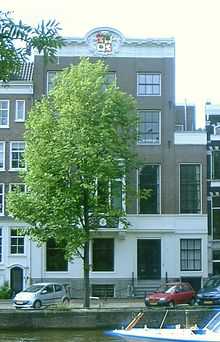Isaac de Pinto

- Not to be confused with Isaac Pinto, an American Jewish publisher.
Isaac de Pinto (Amsterdam, 1717 – August 14, 1787 in the Hague) was a Dutch Jew of Portuguese origin, a scholar and one of the main investors in the Dutch East India Company.
In 1748 Pinto helped stadholder William IV of Orange, sending or lending him money to defeat the French at Bergen op Zoom. In return he asked for uplifting measures against Jewish merchants forbidding them to sell clothes, gherkins or fish on the street. He proposed to send the poorest Jews to Surinam.
Pinto was a man of broad learning, but did not begin to write until nearly fifty, when he acquired a reputation by defending his co-religionists against Voltaire. In 1762 he published his Essai sur le Luxe at Amsterdam. In the same year appeared his Apologie pour la Nation Juive, ou Réflexions Critiques. The author sent a manuscript copy of this work to Voltaire, who thanked him. Antoine Guenée reproduced the Apologie at the head of his Lettres de Quelques Juifs Portugais, Allemands et Polonais, à M. de Voltaire.
In 1763 De Pinto became bankrupt as a result of speculation; he had to sell his house on Nieuwe Herengracht with five famous fixed wall-paintings by Jan Weenix. De Pinto moved to another fine mansion in The Hague; he and his family were invited to the palace when Mozart and his sister played. In 1768, Pinto sent a letter to Diderot on Du Jeu de Cartes. His Traité de la Circulation et du Crédit appeared in Amsterdam in 1771, and was twice reprinted, besides being translated into English and German. His Précis des Arguments Contre les Matérialistes was published at The Hague in 1774. Pinto's works were published in French (Amsterdam, 1777) and also in German (Leipzig, 1777).
References
-
 This article incorporates text from a publication now in the public domain: "Pinto". Jewish Encyclopedia. 1901–1906.
This article incorporates text from a publication now in the public domain: "Pinto". Jewish Encyclopedia. 1901–1906.
- Didot, Nouvelle Biographie Générale, p. 282;
- Barbier, Dictionnaire des Anonymes;
- Dictionnaire d'Economie Politicale, ii.;
- Quérard, La France Littéraire, in Allgemeine Litteraturzeitung, 1787, No. 273.
- Nijenhuis, I.J.A.(1992) Een joodse "philosophe". Isaac de Pinto (1717-1787) en de ontwikkeling van de politieke economie in de Europese Verlichting.
|